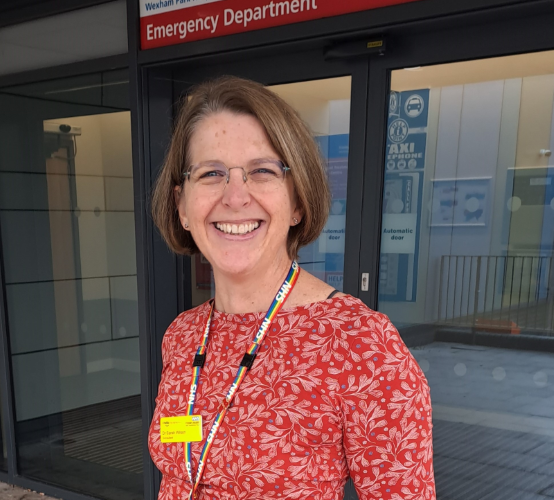 9 January 2024
9 January 2024
Emergency medical consultant Sarah Wilson wants to increase involvement in research across Frimley Health as she assumes a new professorship.
Sarah, who has held her role at Wexham Park Hospital since 2010, has been appointed a Royal College of Emergency Medicine (RCEM) and NIHR Clinical Research Network Associate Professor.
She has been involved in more than 20 different Emergency Department research trials, on studies ranging from fractures and Covid-19 to internal bleeding.
“I applied for the professorship because it’s a new challenge,” she said. “And because I enjoy research and it would give me dedicated time for those studies. As part of the role, I want to further increase engagement and participation in research across the Trust.”
The Associate Professor scheme is open to clinicians who are members or fellows of RCEM and who demonstrate excellence in research and leadership.
The post, beginning this January, is for three years and provides four hours a week of time protected for research, supported by the Emergency Department and by funding from the Frimley Health Charity – one of the charity’s key fundraising principles is to support research at Frimley Health – and Research & Innovation.
Sarah said she is very grateful for the support. “Having that dedicated time means you can take on more projects,” she added. “We should always be learning, be questioning if there is a better, or even simpler, way to do things to improve techniques and healthcare for our patients.”
The protected hours will be used to deliver NIHR portfolio projects locally and also allow Sarah time to develop her own research projects. She is currently involved with aortic dissection research – improving the diagnosis of acute aortic syndrome is one of RCEM’s top ten research priorities – and hopes to develop the next stage of this project.
Other plans include improving the research opportunities offered to patients in Emergency Departments, and ensuring that people involved in research represent the local population.
Sarah believes there could be more options for split roles within the Trust to encourage more people to get involved in research.
“Someone could be working in ED, for instance, but have one day a week for research projects. It means they would have great knowledge of how their department works and allow for a good balance between both roles.”

